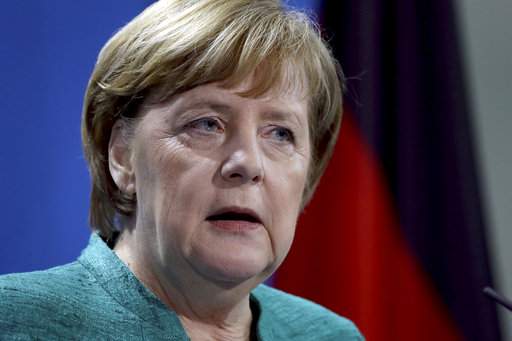-
Tips for becoming a good boxer - November 6, 2020
-
7 expert tips for making your hens night a memorable one - November 6, 2020
-
5 reasons to host your Christmas party on a cruise boat - November 6, 2020
-
What to do when you’re charged with a crime - November 6, 2020
-
Should you get one or multiple dogs? Here’s all you need to know - November 3, 2020
-
A Guide: How to Build Your Very Own Magic Mirror - February 14, 2019
-
Our Top Inspirational Baseball Stars - November 24, 2018
-
Five Tech Tools That Will Help You Turn Your Blog into a Business - November 24, 2018
-
How to Indulge on Vacation without Expanding Your Waist - November 9, 2018
-
5 Strategies for Businesses to Appeal to Today’s Increasingly Mobile-Crazed Customers - November 9, 2018
Hopes for German ‘Grand Coalition’ survive as SPD approves talks
Germany’s Social Democrats backed coalition talks with Chancellor Angela Merkel after a divisive party convention, marking a potential breakthrough toward her fourth term. But many within the party remain opposed to the idea.
Advertisement
European leaders will be focused on Germany this weekend as the party’s Social Democrats (SPD) vote on a “grand coalition” agreement with Angela Merkel’s conservative bloc.
The vote, which took place at a special party convention, was tight with 362 party members voting in favor and 279 against the coalition, according to local reports.
Now, the SPD aims to negotiate an improved coalition deal it can sell to members wary of acting as junior partner to Merkel.
DW’s Thomas Sparrow, who was at the conference, said that the mood of excitement was notable, but that the devil would be in the detail of future talks with the conservatives.
“The party is very divided, like many Social Democratic parties across Europe”, Guntram Wolff, director of the Brussels-based Bruegel research group, said in an interview, predicting a “very tight” vote.
Merkel has made clear that she doesn’t want a minority government an arrangement that would require her to break with her consensual style and cobble together majorities on a case-by-case basis.
The U-turn angered many grassroots SPD supporters, who believed some time on the opposition benches would help the 150-year-old party regain its fighting spirit.
The closeness of Sunday’s vote may end up helping Schulz squeeze more concessions out of Merkel’s bloc, said Andrea Roemmele, a political science professor at the Hertie School of Governance in Berlin. Mrs Merkel is indeed weakened, and the SPD, empowered by its strong.
Leader Martin Schulz faced a strong backlash from the party’s left and youth wings, which argue that the SPD should reinvent itself in opposition. “Yes, it’s true, that we should’nt govern at any price. but it’s also true that we must not not govern at any price, comrades”.
Not that a new Grand Coalition, as this bargain between Germany’s two main political powers is known, will re-gild her once gleaming reputation as the sole political colossus to bestride Europe. “Without the SPD, there will be no bold momentum for the future of Europe”.
In a speech in September, days after the German election, the French president had said he wanted to work on a new treaty.
This agreement, Schulz will tell delegates on Sunday, guarantees substantial European reform and policies for Germany’s low-earners, families and pensioners which will, cumulatively, have a positive effect on their lives. We will provide you the latest news about economy, business and finance, trying to be objective and fully independent.
The poll showed that only 45 percent of Germans were in favor of another grand coalition, although 68 percent of conservatives were in favor, and 57 percent of SPD members.
Advertisement
Should the SPD open the door to another four-year co-habitation – its third since 2005 – with Angela Merkel’s centre-right Christian Democratic (CDU/CSU) alliance?





























